2015 BIFF Report: Korean Debut Directors
by Darcy Paquet, Michelle Cho, Simon McEnteggart,
Jason Bechervaise and Frederick Stiehl
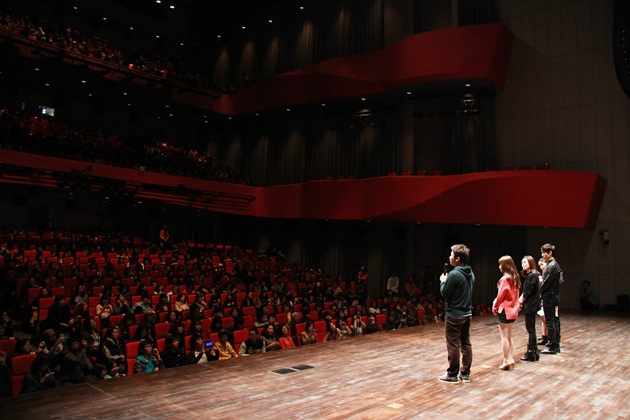
In the "Memories" section of the book BIFF x BIFF, published by the Busan International Film Festival for its 20th edition, Director Park Jung-bum writes about coming to BIFF in the early years of the festival. Sitting in the theater during a screening of Mohsen Makhmalbaf's Kandahar, overcome with emotion, he told himself, "Someday, I will come to Busan with my own film, and screen it here in front of this audience." In 2010, that dream came true, when he premiered his acclaimed The Journal of Musan in the New Currents competition section.
Park's dream appears to be shared by many aspiring directors in Korea. Kim Tae-yong, the director of Set Me Free (2014), tells a similar story, and Korean films about filmmakers, like Cheer Up Mr. Lee (2013), We Will Be Okay (2014), and others, often reference the main character's ambition to secure a festival invitation from BIFF.
In 2015, a dozen Korean directors will receive that honor (one film is co-directed, so that's 11 films in total). This festival report, presented in partnership with the Wildflower Film Awards Korea, will be focused on these 12 directors. By doing so, we welcome them into the film festival circuit, and also hope to focus some attention on their works, since they will be little known to most festival guests.
Quick links:
Communication & Lies by Lee Seung-won
A Break Alone by Cho Jae-hyun
Circle of Atonement by Park Eun-gyoung and Lee Dong-ha
One Way Trip by Choi Jeong-yeol
Blossom by Kim Jin-do
Overman by Seo Eunyoung
Recording by Park Minkook
Girl on the Edge by Park Geun-buem
The Boys Who Cried Wolf by Kim Jin-hwang
Where Am I?: Beyond Girl and Woman by Kim Hyo-jung
Ashes to Ashes by Shin Sang-hoon
Check back during the festival for periodic updates with comments and short reviews about the above films. Note that this festival report will not cover debut films like The Piper or The Unfair which received a commercial release earlier in the year, or films like Collective Invention which screened previously at other film festivals. The 11 films listed above will all be unveiled for the first time at BIFF.
NEW CURRENTS COMPETITION SECTION
![]()
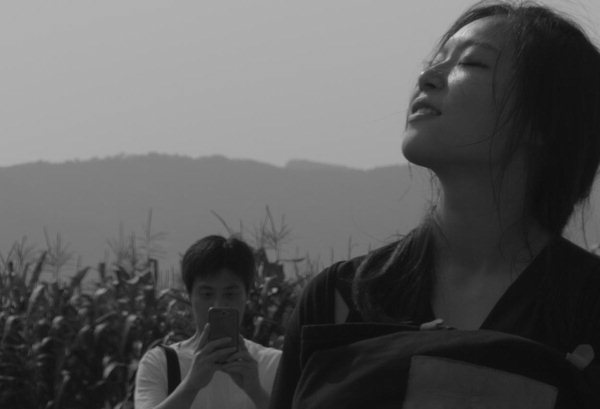 COMMUNICATION & LIES (dir. Lee Seung-won, 103 min)
COMMUNICATION & LIES (dir. Lee Seung-won, 103 min)
Overview: Communication and Lies is the only Korean debut in the New Currents competition section for first- and second-time Asian directors (the other Korean entry is a second feature by Jung Sung-il). A black-and-white feature shot in 4:3 aspect ratio, the film is about a psychologically traumatized couple who engage in scandalous behavior, but who ultimately have trouble communicating with each other. It's a highly explicit film that will make many viewers feel uncomfortable.
Lee Seung-won has been deeply involved in theater and musicals, directing plays such as Truthiness and Moral Family in recent years. He has also shot short films such as Contradiction which screened in the Jeonju International Film Festival, and written both plays and feature film scripts.
Comment by Darcy: "I think it's safe to say this film is not being very well received. It's a work that consciously intends to shock its audience, and personally I have no problem with the upsetting content. It shows us two characters who are destroyed by trauma. I think you can find interesting things to write about this film, but as a viewing experience, I'm not sure it's fully in control of the effect it produces. I spent most of the film feeling sorry for the actors, rather than being pulled into its world."
Comment by Michelle: "A particularly frustrating and prolonged conversation in the opening scene of this film seems to set up the promise of the title - of how hard it is to communicate anything beyond what the addressee is primed to understand. This is an interesting dilemma to try to depict onscreen, especially in the context of contemporary Korean society, in which social norms and rules of engagement ground most daily interactions. But the film tries so hard to overcome its ideas of rule-bound behavior that it ends up conveying a deep conservatism, despite its intentions. I found the connection between sexual deviance and trauma sort of offensive and, worried about the actress, in particular."
Comment by Simon: "The film begins with an impressive 8 minute long take that subversively looks at communication in office politics, one that perhaps speaks more to those familiar with Korean culture and hierarchical norms. Yet from there Communication and Lies rapidly descends as the narrative haphazardly jumps through timelines in an attempt to explore trauma and the neurosis it inspires. The depiction of the central actress' hysteria and sexual deviance is particularly misogynistic, and is more in line with portraying perverse male fantasies than examining the plight of those suffering from psychological angst in contemporary Korea. A missed opportunity." (full review at Hangukyeonghwa.com)
Comment by Jason: "I found this a frustrating viewing experience. It all feels rather pretentious shot in black and white using a non-linear narrative structure, yet has little substance to it, and relies too much on explicit sexual content in an attempt to lure viewers in, but fails."
Comment by Frederick: "I will admit I have somewhat of a bias about self-reflective media, whether media emphasizing its fictive reality or, as in the case of Communication and Lies, focusing on the inability of communication by making a film which is intentionally incommunicative itself. The main problem I have with the latter is that it isn't a matter of the medium being incapable of telling a story, but is rather a deliberate directorial decision to withhold that information. Though there is much to be said for the constant shifts in time actually having a purpose of their own, beyond simply forcing the audience to reconstruct the narrative to find out 'what happened.' Moreover, while the way in which the structure of the film suggests at a fundamental incommunicability is somewhat disappointing, a similar message presented by the mise-en-scene is quite appealing. Frequently two characters are placed in the same room and will completely ignore one another. The anxiety is so potent that it feels as though two scenes from the same location were superimposed one upon the other, a sentiment which makes it all the more powerful when one character does make a meager attempt to communicate with the other, only to be completely ignored. This complete oblivion of the person right in front of them adds to the constant awkwardness and anxiety felt both within the film and by the audience itself, which is further compounded by unnecessarily long takes in which the camera continues to roll long after any action in a scene has ended or in which the characters move so slowly, and often devoid of emotion, as to be uncanny. These techniques are frankly more effective than much of the graphic sexual content - which Communication and Lies far from lacks, one scene in particular provoking several walk-outs. While initially somewhat disappointed by the film when I had walked out of the theatre, however upon more careful consideration there were a number of interesting techniques used in the film. This experimental style is perhaps precisely what garnered Communication and Lies its overall lukewarm reception - some of these experiments do not work and serve only to distract, some appearing to appeal to mere shock value. Other experiments, however, are quite effective and rather intriguing. Though by no stretch of the imagination is it a pleasant or enjoyable film, it is the technical aspects which make Communication and Lies worth seeing at least once, especially for those interested in experimental or transgressive cinema."
KOREAN CINEMA TODAY: PANORAMA
![]()
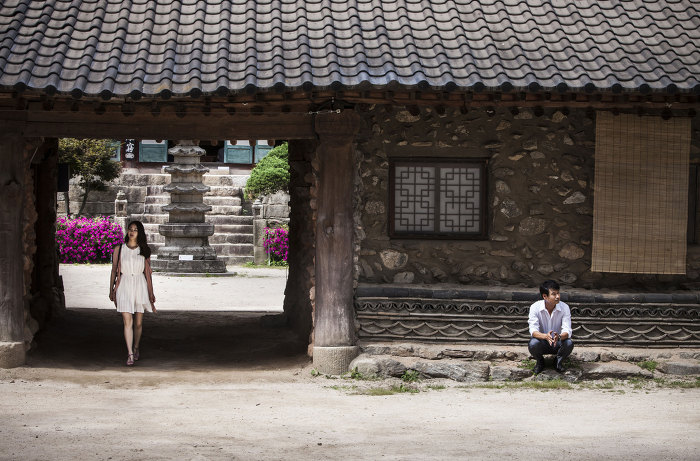 A BREAK ALONE (dir. Cho Jae-hyun, 95 min)
A BREAK ALONE (dir. Cho Jae-hyun, 95 min)
Overview: The feature directing debut from Bad Guy actor Cho Jae-hyun. A Break Alone tells the story of a married middle-aged man who can't get over a woman from his past. The woman, a yoga teacher, has since gotten married, but he finds excuses to hang around in her midst. One day he goes too far, and finds himself in an embarrassing situation. A light-hearted, sad drama starring Park Hyuk-kwon and Yoon Joo.
Cho Jae-hyun has been a fixture on the big and small screens over the past two decades, appearing in films like Crocodile (1996), Sword in the Moon (2002), Romance (2006), The Weight (2012), Moebius (2013) and this year's BIFF entry A Korean in Paris. Apart from his acting career, he serves as the festival director of the DMZ International Documentary Film Festival, and he directed the short film His Special Day (2013) which screened in BIFF's short film competition section.
Comment by Jason: "I wasn't expecting much from this, but Cho Jae-hyun does well in maintaining a strong pace, especially in the second half. Looking at the film's main character, it's difficult to feel much sympathy for him as he becomes increasingly desperate, obsessive and pathetic when he struggles to get over a woman he had an affair with, but I suspect this is Cho's objective as he explores adulterous love and marriage. Yet, I wouldn't describe it as an honest film - it seems too staged for that, and the film's attempt to weave between the past and present doesn't quite work, but it's a worthy debut by actor and now director Cho Jae-hyun. The performances are also solid, which of course, features a small cameo from Cho Jae-hyun."
![]()
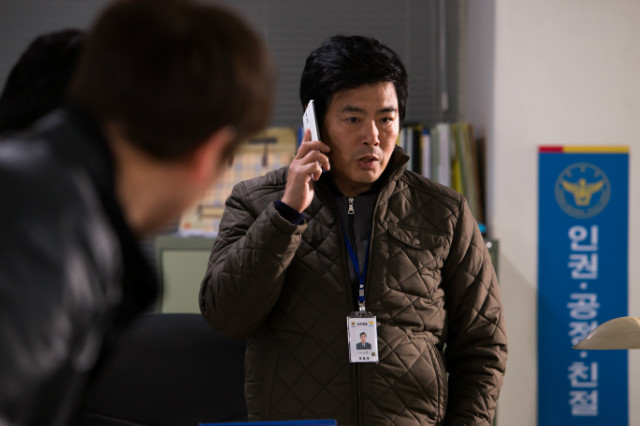 CIRCLE OF ATONEMENT (dir. Park Eun-gyoung and Lee Dong-ha, 100 min)
CIRCLE OF ATONEMENT (dir. Park Eun-gyoung and Lee Dong-ha, 100 min)
Overview: A CGV Arthouse release that will open in theaters on October 15, Circle of Atonement is a drama about crime, revenge, and forgiveness. Son Ho-jun plays a teacher whose wife is murdered in heartbreaking fashion. Sung Dong-il (Mr. Go) plays a detective who successfully tracks down the murderer. However, the murderer kills himself rather than go to prison. Meanwhile, the murderer's daughter (Kim You-jung) ends up being raised by the detective... and years later ends up in the teacher's class.
Park Eun-gyoung and Lee Dong-ha are graduates of the Korean Academy of Film Arts. Park shot the award-winning short film Free to Fly in 1997, worked as a script supervisor on Harmonium in My Memory (1999), and has since written numerous scripts as part of a filmmaking collective. Lee was assistant director on The Happy Funeral Director (1999), shot the short films Continuing Memory (1998) and Black Cut (2000), and was a co-writer on Delivering Love (2008) and The Terror Live (2013). He has been awarded in numerous screenwriting competitions.
Comment by Darcy: "This film had me interested through the first half, but as time went on I stopped believing in the characters. Their psychology as presented on the screen just wasn't very convincing, and the ending especially seemed much too overdone. That said, I liked the quieter moments in the film -- the directors do seem to have talent, and the ability to make ordinary scenes feel engaging."
Comment by Michelle: "The film worked better and the characters rang truer in its first third or so, when it wasn't trying to be a classical tragedy. The casting here works for and against the film; if the detective weren't played by an actor as like-able as Sung Dong-il, I don't think there would be a movie at all. On the other hand, Son Ho-jun's comic image from the popular Answer Me 1994 TV drama and several variety show appearances made it nearly impossible to accept his turn here as a man driven mad by regret."
Comment by Jason: "Parts of this I liked, especially in the first half when it deals with grief (as opposed to revenge). But when it turns into a revenge-themed film, it becomes all too familiar not least when a very genre-driven climatic scene towards the end almost ruins it. It shows elements of promise, but it's frustrating when filmmakers rely too much on conventions to tell a story, especially when it begins in a way that would seem to suggest otherwise."
![]()
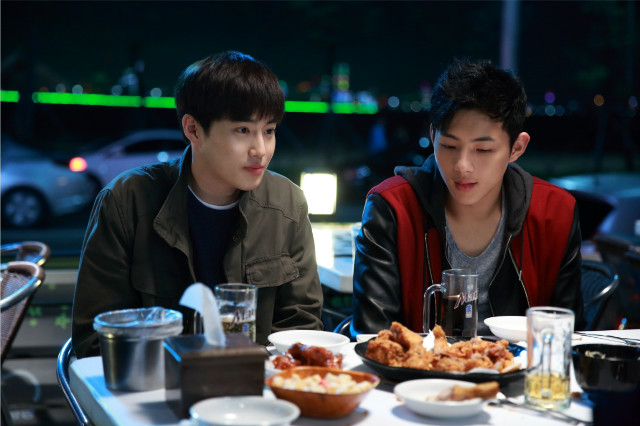 ONE WAY TRIP (dir. Choi Jeong-yeol, 93 min)
ONE WAY TRIP (dir. Choi Jeong-yeol, 93 min)
Overview: Produced by the noted filmmaker Yim Soon-rye, One Way Trip tells the story of four 20-year old boys who travel down to Pohang, in order to send off Sang-woo who will join the navy on the following day. However, their attempt to rescue a woman who is being beaten on the beach leads to a chain reaction of violence and injury. A tragic tale of disillusioned youth, the film stars up-and-coming actors Ji-soo, Ryu Jun-yeol, Kim Hee-chan, and Su-ho from the K-pop boy band EXO.
Choi Jeong-yeol has directed numerous short films, winning the most attention for The Unbearable Heaviness of Nagging (2008) which screened at Rotterdam and other festivals. His other shorts include The Man (2009) and Oldmance (2014).
Comment by Michelle: "This buddy melodrama puts its young cast through the emotional wringer, bouncing between the poles of teen comedy and tragic drama. The film shines brightly in the former mode and flattens in the latter, relying mostly on Ji Soo's performance to convey a central moral quandary. Fortunately, Ji Soo, a rising star, mostly delivers and the film is a crowd-pleaser -- at the screening I attended, younger viewers were completely smitten with the young leads, and the adults seemed to find the sentimental plot cathartic."
KOREAN CINEMA TODAY: VISION
![]()
 BLOSSOM (dir. Kim Jin-do, 100 min)
BLOSSOM (dir. Kim Jin-do, 100 min)
Overview: A meditative drama about relationships and death, Blossom is set in a countryside hospital. Yeon-woo, an X-ray technician, still suffers from an intense childhood trauma. Despite having worked at the hospital for years, he is estranged from other staff members. But a new nurse takes an interest in him, and he slowly starts to open up. The film stars Sim Hee-seop (The Sunshine Boys) and Go Wonhee (The Silenced).
Kim Jin-do, born in 1973, studied filmmaking at the Korea National University of Arts. He served as an assistant director on the 2001 film Wanee and Junha, and participated in the shooting of numerous short films.
Comment by Darcy: "I liked this film. It represents a quieter, more subtle strand (apart from one truly disturbing scene in the middle) within the Korean melodramatic tradition, and while it might not appeal to festival programmers, it will find an audience in Korea. It got some spontaneous applause at the end of the screening I attended. The countryside setting is quite memorable, and there is a realistic texture to the storytelling, except that Go Wonhee is unnaturally cute."
Comment by Jason: "It's a sweet-natured melodrama about dealing with death and pain. Locations and the score resonated with me, and its subtleness works quite well, but don't see it breaking out, especially on the international scene. That being said, it's certainly worthy of some attention, and I suspect some audiences will be quite fond of it."
![]()
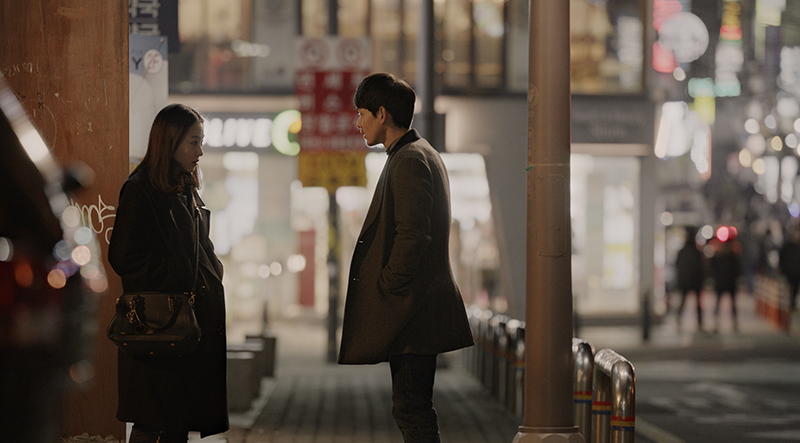 THE BOYS WHO CRIED WOLF (dir. Kim Jin-hwang, 80 min)
THE BOYS WHO CRIED WOLF (dir. Kim Jin-hwang, 80 min)
Alternate title: THE SHEPHERD
Overview: Wanju is a theater actor who also acts in real life. He works as a stand-in boyfriend for single women, and finds dates for unpopular guys. One day a woman asks him to give false testimony about a murder that took place near his home. He agrees, but his lie will prove to have unexpected consequences. Produced by the Korean Academy of Film Arts (KAFA), and starring Park Jong-hwan (Project Get-Up-and-Go, Veteran).
Kim Jin-hwang studied filmmaking at Sejong University and the Korean Academy of Film Arts. He has directed the short films The Ordinary Moment (2012), A and B (2012), Curtain Call (2014), and Mrs. Hwang (2014).
Comment by Darcy: "A well-directed debut film with a somber mood and an interesting central character. The storytelling is unusual in that it doesn't emphasize the major twists and developments in the plot -- they are just presented in a fairly understated way. That makes some parts of the story a bit confusing (especially the end), but it helps to create an unusual, slightly reflective tone. The dark and shadowy visuals are nice too."
Comment by Jason: "One of better Vision titles from this year, and the strongest of the KAFA (Korean Academy of Film Arts) films. It's engaging throughout, and it's well executed. It touches on a topical issue, but fails to really explore it in sufficient depth - to reveal it would give away a major spoiler. Still, as the mystery behind the murder unfolds, it remains largely compelling despite a somewhat overly convoluted narrative."
Comment by Frederick: "The Boys Who Cried Wolf is a relatively entertaining mystery, but one which ultimately fails to deliver on its promises. The major complaint as far as the narrative is considered is that the mystery is rather lineal - one line of questioning leads to another until the events are revealed. There are no major plot twists, no convincingly conflicting testimonies, and instances in which the audience is left trying to sort through the array of evidence to catch the killer before the protagonist. This is further exacerbated by the director's decision to give the audience additional information by occasionally showing scenes between secondary characters, making the audience more privy than even the main character. However, without getting into the specifics, the director does make a very interesting choice regarding the closing of the film, one which serves a clear and effective purpose. The Boys Who Cried Wolf also deals with some very dark themes and issues prevalent, yet not readily addressed, in Korean society, though unfortunately not in as much depth as would be ideal, even if they tie in very well to both the mystery and the message of the film. While the interplay between Wanju and his coworker are quite entertaining, overall the character development has its weaknesses - most egregious is that while the lead's profession would suggest a sort of modern, Korean version of American Gigolo, his world has very little to do with the narrative and it is not even truly dealt with in its own right. Moreover, there are few subplots, and the ones that do exist are rather undeveloped. The Boys Who Cried Wolf is ultimately a film which is enjoyable enough to watch and be engaged with, however, with the notable exception of the unique and well-made denouement, it does not leave very much upon leaving the theater and does not entice enough for a second. This is particularly disappointing given its genuinely interesting premise and its significant potential."
![]()
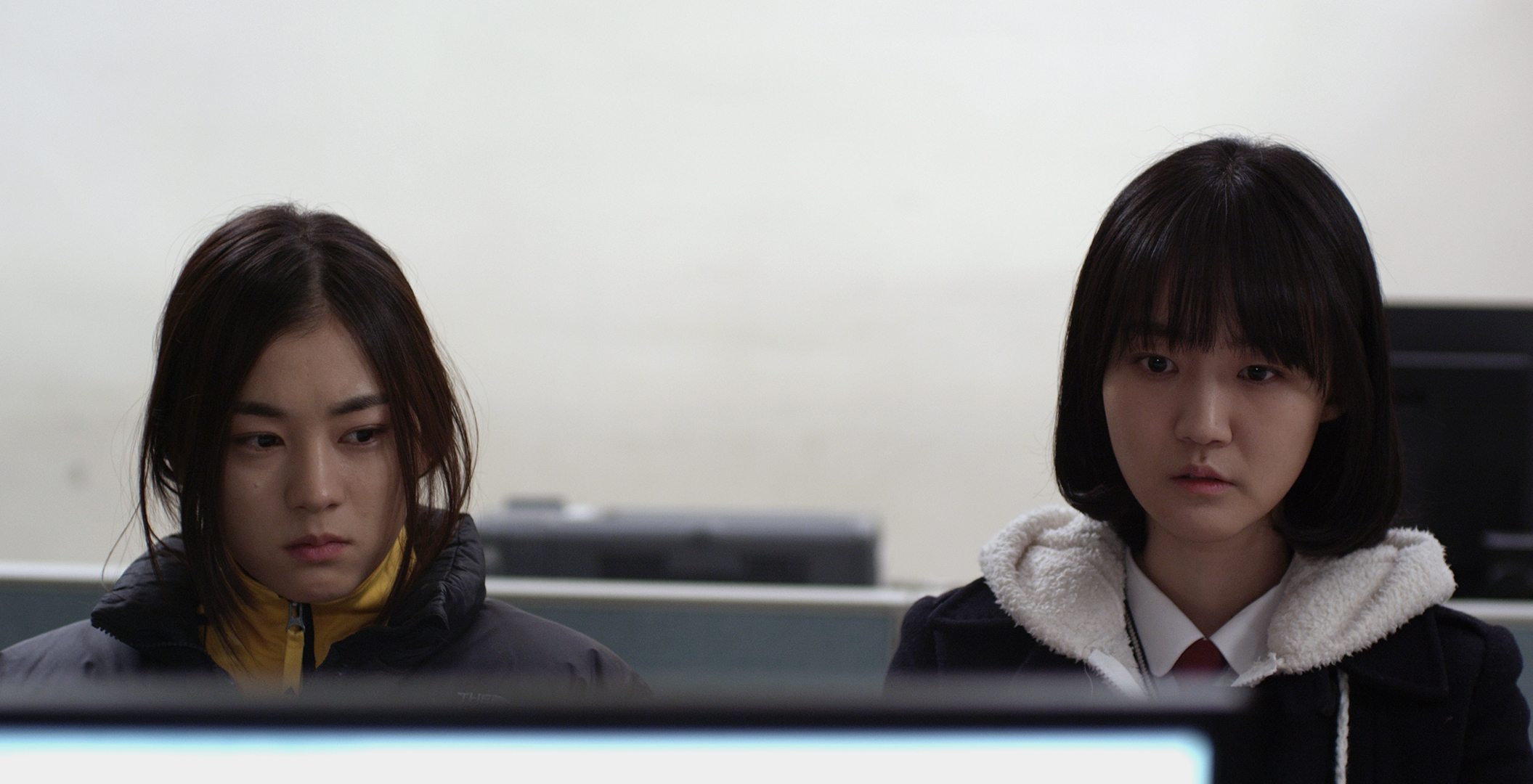 GIRL ON THE EDGE (dir. Park Geun-beum, 93 min)
GIRL ON THE EDGE (dir. Park Geun-beum, 93 min)
Alternate title: SCHOOL GIRL
Overview: Produced by the Korean Academy of Film Arts (KAFA), this film is about a friendship between two high school girls. After getting into trouble, Jin-sook is forced to transfer to a new school, where she gets to know Eun-yeong. But one day Eun-yeong has a crisis at home, and she and her mother end up staying at Jin-sook's house. This is fine, until both Eun-yeong's mother and Jin-sook's money disappear. Starring Gong Ye-ji, an up-and-coming actress who appeared in Shuttlecock, and Park Ye-young in her feature acting debut.
Park Geun-buem, born in 1982, is a graduate of the Korean Academy of Film Arts. His short films have received considerable attention and acclaim, beginning with The Night of the Witness (2012) which won the Sonje Award at the 17th BIFF and subsequently screened at the Clermont-Ferrand International Short Film Festival. His short film Intruder (2014) was nominated for a Student Academy Award in the Foreign Language Film category, and won the Audience Award at the 18th BiFan; while Children (2014) won numerous awards at local film festivals.
Comment by Darcy: "I went into this film with high expectations, because I really like the director's short films. The relationship between the two girls is nicely presented, and both actresses do a really great job. I was a little disappointed that their relationship gets pushed to the side in the second half, due to a complicated plot involving Eun-yeong's mother. It's an issue of narrative structure, I guess, but all in all I enjoyed watching it."
Comment by Michelle: "I was rooting for Gong Ye-ji's character Jin-sook from the get-go (I was less compelled by Park Ye-Young's excessive naivete), and the film's portrait of a kid who's wise beyond her years and has fallen through the cracks made me think of the strength of similar characterizations and performances in Park Suk-young's Wild Flowers from last year. What happens in the second half of the film, though, only made sense to me as a decision to mash-up indie-realism and K-drama histrionics. The end result is perhaps a concession to commercial sensibilities, and this seems to be an inexorable trend, not just in Korean independent film, but more broadly. So, like Darcy, I still enjoyed this film, despite its swerve into hackneyed class criticism via chaebol misbehavior."
Comment by Simon (Hangukyeonghwa.com): "As a fan of films that explore modern feminist issues, I was quite curious about Girl on the Edge. It begins promisingly enough, setting up characters and events well - particularly the role of Jin-sook, wonderfully performed by up-and-coming talent Gong Ye-ji. However just as the core relationship between the two girls is established, the narrative swerves into contrived genre territory alongside acting that exudes TV-drama theatricality, and I became disengaged. For me, the film's saving grace is the performance of Gong Ye-ji who really shines throughout, and is certainly an actress to keep an eye on."
Comment by Jason: "It's not really sure what it wants to be. Half social commentary but turns more into a genre film half way through when a body is found. I liked a sequence that takes place in a tunnel towards the end but the film as a whole needs too much in the way of explanation as the plot unravels. However, the two leads: Gong Ye-ji and Park Ye-young both demonstrate a great deal of potential and I look forward to seeing their careers progress."
Comment by Frederick: "Girl on the Edge is a thoroughly enjoyable movie whose entertainment value is driven largely by its cast. The characters, while possessing clearly exaggerated personalities and following recognizable archetypes, are all very relatable and fun to watch (with perhaps the lone exception of one of the villains who comes off as exceedingly cartoonish). Jinsuk is particularly entertaining, her persona well established through her expressions and her seemingly endless stream of smart-alec quips. Despite her comedic presentation, she is nonetheless a deep character, who experiences relatable conflicts and has a clear and well developed character arc. While the mystery itself is relatively straight-forward, its real purpose is to serve as a drive for the main characters and their interactions throughout the film, the true highlight of the feature. Of course, the relationship between Jinsuk and Eunyoung takes center place, and is an endearing story of friendship between two social outcasts with a number of parallels that further enhance their characterization. From a marketing standpoint, this film's themes and tones seem as though they would fit perfectly for middle and high school audiences (though is more than enjoyable by older teens and even adults), however Girl on the Edge is far too replete with obscenities to receive a 12+ rating, and honestly seems to push its 15+ rating to its limit. A comedic tale of friendship set in the framework of a mystery thriller, Girl on the Edge never ceases to entertain with its ensemble of endearing characters who complement one another perfectly - in a word, Girl on the Edge is simply a fun movie."
![]()
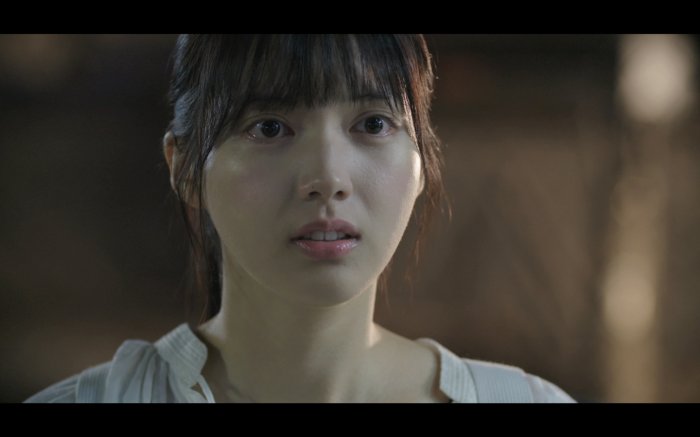 OVERMAN (dir. Seo Eun-young, 103 min)
OVERMAN (dir. Seo Eun-young, 103 min)
Overview: High school gymnast Do-hyeon gets in a fight, and is made to do community service in the library as punishment. While there, he notices the girl Su-hyeon who keeps coming in to borrow books. The two of them start talking, and gradually they grow closer. But underneath the surface, both of them are suffering from their own personal issues. A coming-of-age film starring Kim Jung-hyun and Kim Ko-woon.
Seo Eun-young is a graduate of the Korea National University of Arts. Her short films, including Rainy Season, Start of Murder (2014), and Albaparadaiso (2014) have screened at numerous international film festivals and picked up several awards.
Comment by Darcy: "To me this film felt like a missed opportunity. I liked the characters and the general idea of the film, but I had two issues with it. First, it didn't feel authentic. Everything that takes place in the film could have happened in reality, but it wasn't presented in a way that fully convinced the viewer. And second, the film had trouble wrapping up the story in an efficient way. I still have some affection for the movie, but it could have been better."
Comment by Jason: "It deals with some interesting issues including looking after a parent with Alzheimer's, but ultimately, it's just a very standard melodrama and ironically lacks authenticity in the way it's all being conveyed. It's also far too long and the last 10-15 mins could be cut out when it further outstays its welcome."
Comment by Frederick: "A story of first love, Overman contains just about every cliche in the book, but is still an extremely entertaining and endearing film and reminded me of the Korean romantic comedies I would watch some ten to fifteen years ago. The light tone, however, does not mean that Overman does not explore some very dark themes, including coping with a parent with Alzheimer's disease, mental illness, and suicide. The light-hearted, and honestly just plain fun, moments between the two young main characters serve to compliment the darker content perfectly, causing the effects of both to be more pronounced. The literary references vary from well integrated to feeling shoehorned in, the titular reference leaning towards the latter. Without discussing the director's interpretation of Nieztsche, although the students' symbolic use of the Ubermensch matches the theme of the film quite well, the use of Thus Spoke Zarathustra in Overman's narrative is generally awkward. This is perhaps because, unlike many of the other works referenced, the actual text is never read aloud, but only described. Nonetheless, both main characters are very relatable and fun to watch. I felt very immersed in the action of the film and found myself emoting along with the characters. My only other complaint would be that there was a very interesting subplot and associated minor characters which were introduced without much further development. This may very well be the product of time, budget constraints, or concerns about muddling the main plot too much, however I would have loved to learn more about those characters and their motivations. While Overman may fail to live up to some of its artistic ambitions, it is nonetheless a well-made and very enjoyable film."
![]()
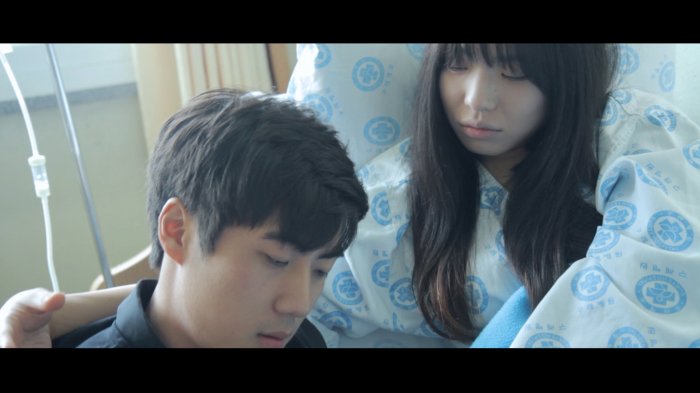 RECORDING (dir. Park Min-kook, 95 min)
RECORDING (dir. Park Min-kook, 95 min)
Overview: Sort of a cross between The Fault in Our Stars and The Blair Witch Project, Recording may well have created its own genre: the found-footage melodrama. Yeon-hee, in her early twenties, has terminal stomach cancer. She decides to record as much of her remaining time as possible, with the help of her boyfriend and a film director she knows. In the process, we learn all about their backgrounds and their relationships with each other. Shot in Seoul, the film stars Kim Hye-yeon, Choi Hyun-woo, and Seo Jin-won.
Park Min-kook is an actor by training, who then went on to direct in the theater. He also acted in the short film Standing at the End of the Horizon (2013) before writing and directing Recording. Park himself makes a funny cameo in this film as a customer who has called in to get his internet connection fixed.
Comment by Darcy: "In its storytelling this film has a lot in common with the many found-footage horror films that have been shot in recent years, but instead of shock horror, we get the heartbreak of a young girl battling cancer. Perhaps there's not so wide a distance between horror and terminal-disease melodrama, because the concept ends up working pretty well. The hand-held camera and home-video realism make her illness seem more harrowing. Sometimes the film is too clever, or too choreographed, and ultimately it's not doing much more than creating an emotional effect. I doubt it will appeal to international film festivals, but it strikes me as one of those independent features that could break out and reach a wider audience in Korea."
WIDE ANGLE: DOCUMENTARY COMPETITION
![]()
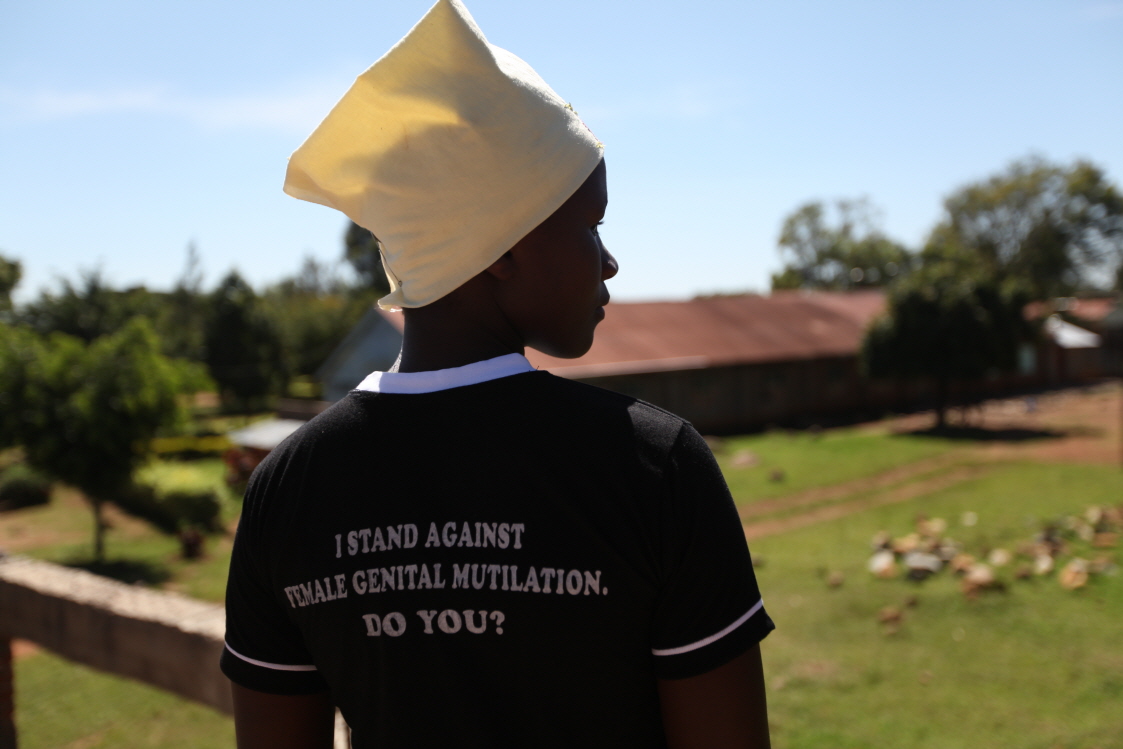 WHERE AM I?: BEYOND GIRL AND WOMAN (dir. Kim Hyo-jung, 100 min)
WHERE AM I?: BEYOND GIRL AND WOMAN (dir. Kim Hyo-jung, 100 min)
Overview: This documentary about Female Genital Mutilation (FGM) in Africa is informed by a feminist viewpoint, but makes an effort to hear from a variety of perspectives on the issue. By interviewing many different people in the communities in which FGM takes place, including both supporters and critics of the practice, the film seeks to capture the interplay between tradition and reform, and explore the question of how change can be enacted.
Kim Hyo-jung studied creative writing and film before entering Sidus Corporation and working as a producer on films like Truck (2008). In 2010 she launched the company Dreaming Oasis Pictures, which produced Lee Cheol-ha's 2013 documentary Hello?! Orchestra. She serves as writer, director and producer on Where am I? Beyond Girl and Woman.
Comment by Frederick: "Despite my having a generally feminist outlook and participating in a number of feminist organizations, female genital mutilation is a topic in which I tend not to be particularly invested. This is because it seems so obviously abhorrent a practice that further inquiry is unnecessary, and, as a practice conducted in a country thousands upon thousands of miles away, one which I have little power to affect change. Most essays or reports I have seen regarding FGM are similarly unequivocally condemnatory. It is from this perspective that Where am I? Beyond Girl and Woman is such a well-made and intriguing documentary. The film delves deeply into the social and cultural context of FGM in a number of countries, including Kenya, Uganda, and Ethiopia. Perhaps the most interesting directorial decision was to frame the film as a sort of bait and switch - in which FGM is initially presented as a cultural more with divided opinion domestically, and among its advocates are even some of the circumcised women themselves. So effective is this framing that the beginning had me momentary questioning my own unconditional condemnation of the practice. However, Where am I? quickly dispels a lot of the myths perpetrated by FGM apologists - demonstrating that what is claimed to be free choice is in many ways the result of intense social pressure, including the alienation of those who refuse the procedure, criticizing the core of their gender identity, and even physical intimidation and violence against those who attempt to protect even their own daughters. The claims of precautions taken to ensure the cleanliness of the procedure (such as sterilized blades) are similarly dispelled as the ignorance of those without proper medical training with access only to unregulated medical suppliers whose authenticity is uncertain. Where am I? also covers a number of local community organizations and government bodies which fight against FGM. It is perhaps in this context, along with the cultural barriers to ending FGM, which make Where am I? most appealing, as, although the specifics will be different, many of the mechanisms reinforcing gender inequality can be extrapolated to other issues and even to other societies, including Korea and the United States. Where am I? Beyond Girl and Woman is a very thought-provoking documentary, adding nuance and varied considerations to an issue usually dealt with through unequivocal condemnation without understanding the cultural context in which the problem arises and the factors inhibiting progress - the film works both as an excellent example of a well-made documentary, as well as a compelling work for anyone interested in issues of gender equality."
WIDE ANGLE: DOCUMENTARY SHOWCASE
![]()
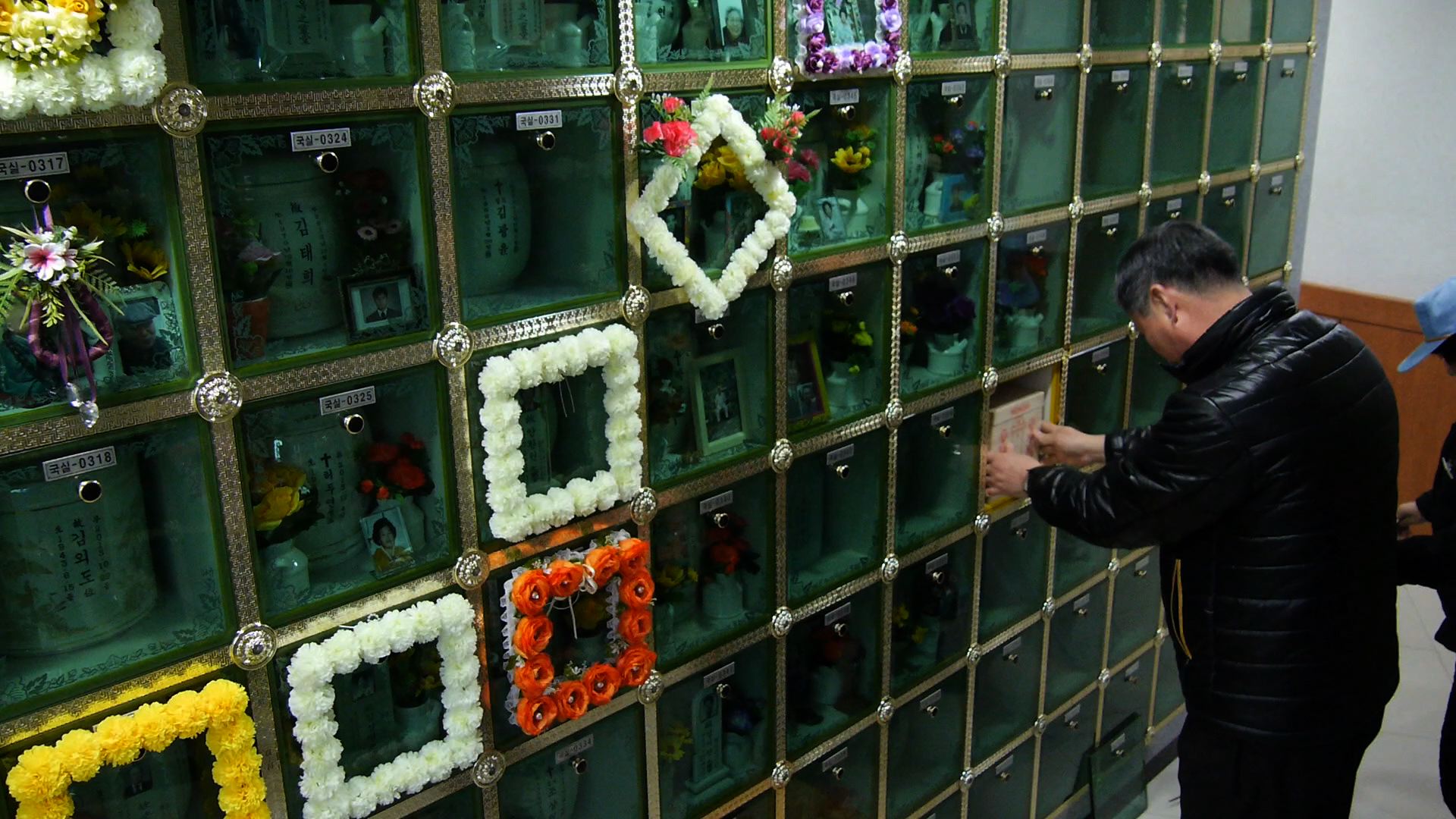 ASHES TO ASHES (dir. Shin Sang-hoon, 79 min)
ASHES TO ASHES (dir. Shin Sang-hoon, 79 min)
Overview: Every five hours in Korea, someone dies without family or friends to look after their remains. Such solitary deaths have become a calling for Kang Bong-hee, who volunteering his own time and money, arranges for the deceased to be cremated and tends to the articles left behind. Although sometimes coming across as a somewhat gruff person, this documentary follows him and tries to understand his motivations.
Shin Sang-hoon majored in visual arts production and worked as an assistant director on the documentary With or Without You, which opened in cinemas at the end of September. His pitch for Ashes to Ashes successfully won funding from the Korea Creative Content Agency (KOCCA) and the National Geographic Channel Korea.
Comment by Darcy: "This film grabbed my attention from the very opening. It's partly about the prospect of dying alone, with no one to mourn you, but more than that it's about volunteering and finding something meaningful to do with your life. Kang Bong-hee looks and acts like a very ordinary guy, but what he is doing is remarkable. The documentary is mostly observational in style, showing us what he does without any narration, interview-style questions or comments from the director. The only thing added is the occasional bit of music."